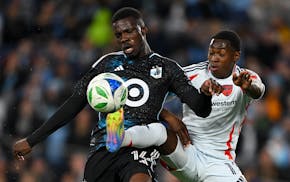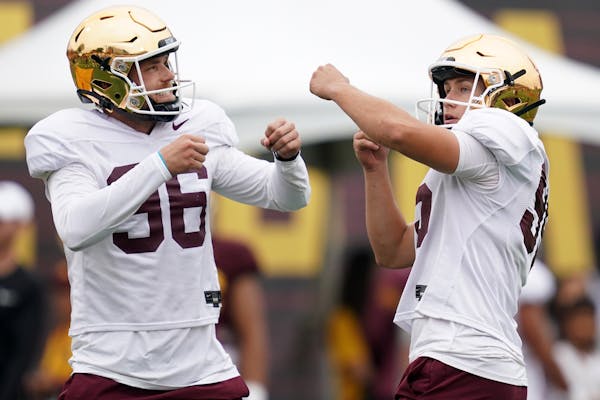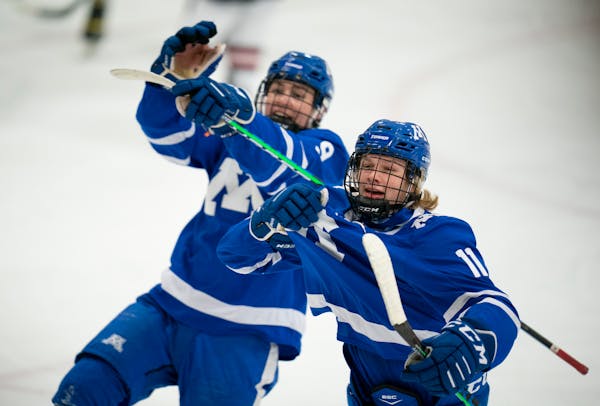Joe Rossi took a moment to feel sorry for himself, alone in the locker room while the rest of the Gophers coaching staff met elsewhere in the football facility.
It was 34 degrees and raining, and his task that day was to drive around campus on a golf cart with no windshield to make sure players were attending class. Basically, grunt work assigned to young coaches just breaking into the business.
Except Rossi wasn't a newbie. He already had been a defensive coordinator at three different schools, including in the Big Ten at Rutgers. His coaching career had been on a steady trajectory upward.
He came to Minnesota in 2017 with the understanding that he would become a full-time assistant, but first he spent a year on the bottom rung as a quality control coach, doing class checks in miserable weather among other tasks.
He went to the locker room to pout that day. He gave himself a scolding instead.
Stop complaining, he told himself. Get your butt upstairs and go do your job.
That's how Rossi solves problems — he goes to work.
"You have to work to get what you want," he said.
That straightforward mindset has served as a guiding principle in Rossi's life, his coaching career and in transforming the Gophers defense into a success story after taking over as coordinator during the 2018 season.
“He prepares us like no other coach. He coaches us harder than any other coach, and that shows in our play, too.”
Last season, Rossi's unit finished No. 3 nationally in total defense and tied for No. 6 in scoring defense. The Gophers recorded their lowest rushing yards allowed average since 1962, lowest total yards allowed average since 1966 and lowest points allowed average since 1977.
To fully understand how defense became a strength at Minnesota, one must know the architect's backstory and trace his bedrock coaching tenets to their origin.
Peewee film study
Right here is a good place to start that journey …
"He was a natural coach by the time he was 12," said Frank Conforti, Rossi's youth football coach in Pittsburgh.
Rossi played center in a single-wing offense. It was a specialized position that required unique skill because the offense thrived on deception and misdirection and Rossi's direct snap initiated everything. The snap needed to lead the ball carrier and fired backward a foot off the ground so that the defense couldn't discern his intended target.
A legendary single-wing coach in Pittsburgh peewee football lore named Baz Fitzpatrick came out of retirement to work with Rossi's team. He presented Rossi with a signed laminated 3x5 index card that certified him as being proficient at single-wing center.
Rossi studied video of his peewee games. In ninth grade, he became Conforti's assistant coach. Rossi would shower after freshman practice and then ride with Conforti to coach the Morningside Little Vikings. He coached the youngsters throughout his own high school career.
"He had a clarity of purpose even then," Conforti said.
Rossi chose to play at Division III Allegheny College in part because coaches offered him a work study position in the football office. He started every game in his playing career and earned the trust of his coaches as an assistant-coach-in-training.
His defensive coordinator, Jack Leipheimer, assigned him an assortment of projects. One day, Leipheimer asked Rossi to watch every single play from a game and draw a line showing what all 22 players on the field did on each play after the ball was snapped. The exercise took him hours to complete. His report was meticulous.
"I knew right then that he was going to be a good one," Leipheimer said.
A coaching mission
Rossi became a coaching intern at Thiel College during his final semester at Allegheny. He'd wake up at 4 a.m. to make a 40-minute drive to oversee Thiel's winter conditioning workouts. Sometimes, he would leave in the wee hours as his college buddies were returning home from a late night on campus.
"I was in a hurry to get started [coaching]," he said, though he jokingly acknowledges a tinge of regret for not taking full advantage of the social scene in his final college semester.
He absorbed everything Conforti and Leipheimer drilled in him about attention to detail and leaving nothing to chance on a football field. They were sticklers about fundamentals, so Rossi became a stickler too.
Rossi has never called either man by his first name. Too much respect for them as his former coaches. But both were groomsmen in his wedding.
"I wouldn't trade my experience for anything," he said.
Connecting with players
Rossi was defensive coordinator at Rutgers in 2015 when head coach Kyle Flood and his entire staff got fired. Rossi had been promoted at every stop in his career, never fired. Rutgers was new to the Big Ten, and Rossi's defense got beat up.
"All of a sudden, you're on a staff that loses and the head coach gets fired and now you are a terrible coach," he said. "That's what everyone thinks and believes."
He and wife Lynsey welcomed their first child a few weeks after he lost his job. Rossi took a year off from coaching to focus on being a dad and to re-evaluate himself as a coach.
He had video coordinators that he knew send him game film to study. He visited 13 different schools — high school to SEC — to watch practices and glean ideas from coaches.
He got back into running. He read more books (with an emphasis on leadership) than he had the previous five years. He revamped his playbook and wrote a head coach manual in case he gets that opportunity someday.
His self-reflection led him to an important discovery. At Rutgers, he spent so much time and energy on devising a sound scheme that he lost personal connection with his players.
That's not going to happen again, he told himself.
"I saw a shift in him," wife Lynsey said.
Gophers players speak glowingly about his influence on them as players and in their personal lives. They refer to him as the "Guru" because of his football IQ and his ability to remember specific plays from years ago.
He doesn't possess a photographic memory, he says. He was a history major, but he's forgotten many key historical events. He jokes that his wife will tell you that he can't remember a conversation they had last night. But ask him about a blown coverage in a game eight years ago and he will recall the sequence with clarity.
"I think it comes from loving coaching football," he said.
Rossi's objective in game prep is to remove as many unknowns as possible. He'll show players similar plays and point out when they executed it correctly and when they got it wrong. He reminds them that the difference is in the details.
"He prepares us like no other coach," senior linebacker Mariano Sori-Marin said. "He coaches us harder than any other coach, and that shows in our play, too."
When putting together his game plan, Rossi often seeks input from his leaders. For instance, if he is considering multiple ways to scheme a particular alignment, he will call Sori-Marin and ask which one he prefers.
"Most of the time, if not always, we're going to do what they feel more comfortable with," Rossi said.
He shows his trust by empowering them. Putting in time and work serve as currency, lessons he learned from coaches who nurtured his thirst for football and coaching before he was old enough to shave.
He still clutches his Pittsburgh roots with immense pride. After Baz Fitzpatrick died, his family offered Conforti some keepsakes from his peewee coaching career. Conforti took Baz's old whistle and gave it to Rossi. For years, Rossi kept the whistle in his bag that he took to games.
Rossi notes he's superstitious, so it just became habit. But there might be more to it than that. Perhaps it was a reminder of home and the imprint made on him from coaches he adores. That details and preparation cannot be shortchanged and to never leave anything to chance.
Joe Rossi era
A look at the Gophers defensive numbers in Joe Rossi's three full years as coordinator:
Year Points allowed (national rank) Total defense (rank)
2019 22.5 (36th) 306.6 (10th)
2020 30.1 (69th) 415.9 (72nd)
2021 17.3 (6th) 278.8 (3rd)
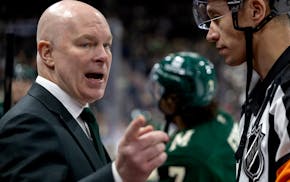
For Wild's leader, playoff time and payoff time arrive together

Twins' skid against the Braves reaches double digits with 4-3 loss
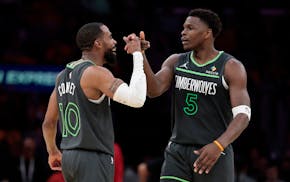
Timberwolves get on a roll and make Game 1 a 117-95 rout of the Lakers

Timberwolves 117, Lakers 95: 10 points about Game 1 in the NBA first-round playoff series
